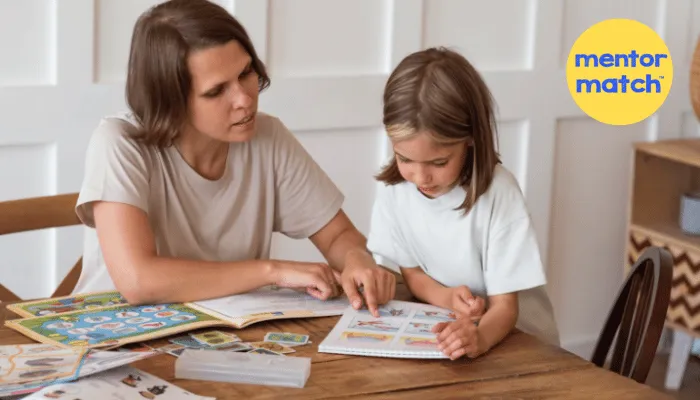
77.32% of parents see better grades in 3 months!
Does the number of words a toddler says really matter in the long run? A question asked by every parent and the answer is, yes, absolutely!
A recent research showed that a young child’s vocabulary is closely linked to their later success in school. In fact, having a large vocabulary at two years old can predict how well a child will do in kindergarten in several key areas like reading, math and behavior.
Having strong skills in these areas at kindergarten entry can have a lasting impact on a child’s overall success in school and life. Parents must realize this responsibility to help their little ones build a large vocabulary early on.
We know every child is different and special in their own way, hence they also develop their communication and vocabulary skills at different rates so don’t panic when you see your child learning at a slow pace.
In this blog, we are going to explore and pass on some useful information on how you can build a vocabulary lesson plan for first grade. Help your child expand their word bank in exciting ways. From playful conversations to storytime discoveries, show how learning new words can truly become a joyful part of your and your child’s every day routine.
Let’s ditch the monotonous ways of learning new words, and incorporate some fun and engaging vocabulary activities.
Children Learn What Parents Say!
Not just the first graders but even the tiniest tots love learning new words!
We are sure parents have heard their toddler lisp some of the words they use at home, it's cute, isn’t it? There’s nothing quite like hearing “spaghetti” come out as “pasketti” or “ambulance” as “ambience”!
By spicing up the daily chats with your little ones with vivid and interesting words, expand their vocabulary and understanding of the world. Schools also play a huge role in incorporating fun and interactive vocabulary lesson plans for first grade to introduce them to new words.
Read With Your Child Every Single Day!

As kids, we all loved storytime. It was an escape to a fantasy world and broadened our imagination, but it also proved to be a treasure trove of new vocabulary.
While reading, when you come across a word like “mischievous”, pause and ask your child what they think it means? You might get a giggle-worthy guess! Then, give them a fun, kid-friendly definition and connect it to a similar word and a shared experience.
“Remember when Fluffy knocked over the vase? That was mischievous!” It’s also similar to the time when your child tried to sneak an extra cookie before dinner and ended up with crumbs all over their face, they were being mischievous too!
This playful approach ties into your child’s school’s vocabulary lesson plan for first grade, where engaging activities help reinforce these new words in a memorable way.
Patience, Patience, Patience!
Remember how it took a few tries before your child finally got the hang of tying their shoelaces? Vocabulary works the same way! Practice and repetition help them master new words.
Even as adults, it took us sometime to build a robust vocabulary and its the same for your little one as well. It takes time and patience. Don’t expect your child to master a new word after just one conversation or story. They will eventually learn and remember after hearing words repeatedly.
So, keep the conversations lively and the books open, and watch their word garden grow!
For a structured approach to building their word bank, Mentor Match’s personalized online tutoring can make learning new words both fun & effective by incorporating a vocabulary lesson plan for first grade.
Also Read: Pros And Cons Of Personalized Learning For Students
Grocery Store Vocabulary
Ever tried explaining a "pomegranate" to your child? It’s like a fruit with a million tiny jewels inside! Or stumbled upon "butternut squash" and wondered if it’s a vegetable from a fantasy land?
Use lively descriptions to make these new words stick. For instance, “A pomegranate is like a little red treasure chest full of tiny, juicy gems!”
So, every time your child comes across the word gems or jewels, they’ll remember the fruit they associated it with or vice versa. Just simple activities like these go a long way!
Start at the Root
Let’s dig into root words like "jump." Ask your child to think of other words that use "jump," like jumping, jumped, and jumpy. It’s like a family of words with the same energetic vibe! Discuss how each word shares the idea of "leaping" in some way. It’s a word party where everyone has a common theme!
If parents want to keep the fun going and expand their child’s word skills even more, consider designing a vocabulary lesson plan for first grade that includes activities that explore these word families in engaging and interesting ways.
Consider the Prefix
A vocabulary lesson plan for first grade packed with fun activities and creative ideas would sound just right if parents want to dive into this prefix adventure to make their child’s journey more exciting.
Prefixes like "un-" and "pre-" are like magical word tools that change meanings..
For instance, "un-" can turn “happy” into “unhappy” or “do” into “undo.” How cool is that? Challenge your child to find words with the prefix "pre-", like "preview" and "preheat." It’s a prefix adventure that reveals how words can transform!
Explore Mentor Match’s online tutoring for a personalized touch and more engaging lesson plans!
Homonym Fun
Homonyms are like word twins with different personalities.
Examples:
- Bat: the animal that flies at night, the sports equipment used in baseball
- Light: something that makes things visible, not heavy
See if your child can come up with different meanings for these words. It’s a fun game of “Which meaning fits best?”
Just like how words can have unique personalities, so do children! They are unique and learn in their own way. We are sure a vocabulary lesson plan for first grade is a great idea to make the most of these playful word games.
And if you’re curious about how personalized learning can make a difference, check out Mentor Match. They’ve helped countless kids like Kelly herself who went from 3.2 CGPA to 3.8 with their online tutoring.
Check out our success stories from parents here!
Explore Your World
Turn every outing into a word exploration mission! At the park, spot a "squirrel" and explain it’s like a tiny, fluffy acorn hunter. At the beach, talk about "seashells" and how they’re like little natural sculptures. It’s like taking your child on a vocabulary adventure wherever you go!
After all, isn’t it amazing how the simplest thing can become extraordinary learning moments?
Also Read: A Guide To Building Curiosity For Education In Children
“What’s Another Word For…”
Play the game of finding synonyms to show that words can have many faces. Look around and ask, “What’s another word for ‘happy’?” (joyful, content). Or, “What’s another word for ‘house’?” (home, dwelling). You can even explore how two words, like "apartment" and "condo," might be similar but have different features. It’s a fun way to discover the many ways we can describe the world!
By turning everyday moments into a synonym scavenger hunt, you’re setting the stage for a richer vocabulary experience.
As you wrap up these playful activities, remember a vocabulary lesson plan for first grade can make every word adventure both engaging and educational.
At the end of the day, it’s all about building a strong foundation for your child’s language skills while having fun along the way.
Conclusion
As parents, there is nothing quite like the excitement of hearing your child say their first words. Camera comes out, and you eagerly call your partner to witness the most anticipated moment. In all honesty, it's a proud moment for every parent and for the child as well when they see their parents bursting with joy.
That said, incorporating the above mentioned interactive vocabulary activities into your daily routine, you’re giving your child a head start in mastering words and language. From homonym fun to synonym games, and using everyday experiences as learning opportunities, you’re watching your child’s vocabulary blossom, one word at a time!
For a more personalized approach and engaging lesson plans, explore Mentor Match’s online tutoring. Book a Book a free trial today and see how their expert tutors can help your child thrive in their vocabulary adventure!



.png)
.webp)
.webp)